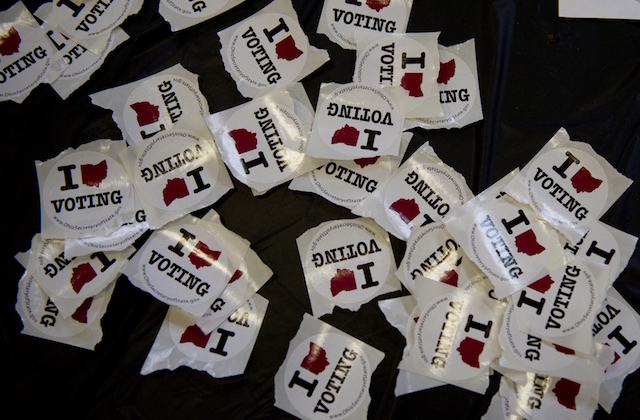The road to the 2016 election is long and littered with voting rights challenges. The latest: The American Civil Liberties Union (ACLU) of Ohio and Demos filed a lawsuit against Ohio Secretary of State Jon Husted yesterday (April 6), alleging that he is infringing on the rights of voters.
In 2015, Husted purged the voter rolls, cancelling the registrations of the estimated 40,000 people living in Cuyahoga County who didn’t vote in the last three federal elections. Cuyahoga is the state’s largest county, where people of color make up 40 percent of the population and nearly 20 percent of all citizens live in poverty (the national average is 14.8 percent). ThinkProgress reports that over the past five years, about 2 million people have been removed from the polls via this practice, which Husted’s office calls the “Supplemental Process.”
The ACLU and Demos call it “illegal,” alleging that it disenfranchises eligible voters and violates the National Voter Registration Act of 1993 (NVRA), which is known as the “motor voter law.” The NVRA says that states can only remove voters from rolls under three conditions: death, an out of state move or a direct request to be removed. It also says that list maintenance programs must not discriminate against any subsection of voters. The plaintiffs—the Ohio A. Philip Randolph Institute and the Northeast Ohio Coalition for the Homeless—also argue that Husted’s process is unnecessary, as the state uses United States Postal Service info to regularly update rolls.
Per the suit:
Among other requirements, the NVRA requires states to “make a reasonable effort to remove the names of ineligible voters from the official lists of eligible voters by reason of…a change in the residence of the registrant.” To realize the NVRA’s defined purposes, however, Section 8 imposes strict requirements and limitations on states’ list-maintenance procedures and activities. One such limitation is the near-categorical prohibition against removing voters for failure to vote. The NVRA’s restrictions reflect Congress’ intent that “once a citizen is registered to vote, he or she should remain on the voting list so long as he or she remains eligible to vote in that jurisdiction.”
These restrictions also reflect a legislative finding that purging voters for infrequent voting “has a disparate impact on minority communities” and particularly burdens “poor and illiterate voters [who may be] caught in a purge system which will require them to needlessly re-register.”
In the suit, the plaintiffs ask the U.S. District Court for the Eastern Division of the Southern District of Ohio to declare the supplemental list-maintenance process a violation of the NVRA, issue a temporary restraining order that will prevent additional purges in the short term, issue a permanent injunction that will ban the process moving forward and restore previously purged voters to the registration rolls.
This isn’t the first time Husted’s actions have been called into question in a place that many experts consider to be the most important of the swing states. In March, a judge issued an emergency order to prevent him from blocking 17-year-olds from voting in the primary despite the fact that they would be 18 in time to vote in the general election (a practice that is legal in 21 states and the District of Columbia). Husted also publically opposed executive action on immigration, claiming that it would allow non-citizens to vote. His 2014 investigation into alleged voter fraud found that just .0002 percent of the state’s 7.7 million registered voters were actually ineligible to vote.
